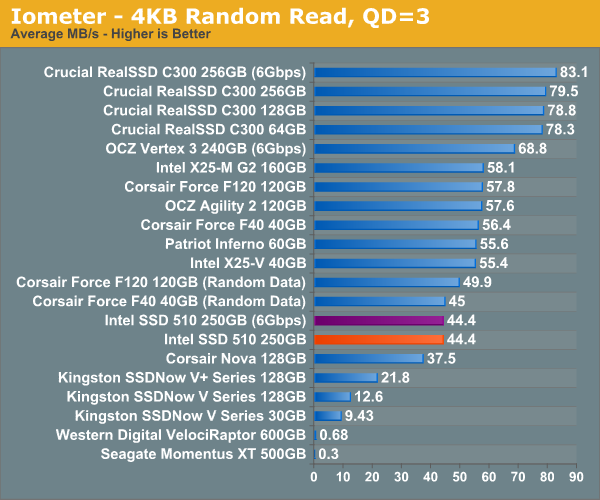Correction: OCZ Vertex 3 Random Read Performance Data
by Anand Lal Shimpi on March 2, 2011 9:37 PM EST- Posted in
- Site Updates
- Corrections
A huge thanks goes out to AnandTech reader Andrei and some very attentive Xtreme Systems forum members. I just got an email pointing me to this thread where one particular number from our OCZ Vertex 3 and Intel SSD 510 articles was called into question. The problem? The 4KB random read numbers for the Vertex 3 were supiciously high. The reality? They were incorrect.
I was just alerted to the error and quickly powered up the SSD testbed to recreate the test. It looks like the original numbers were either run at a queue depth of 32 or accidentally copied from one of the runs of 4KB random write tests. Either way the number was incorrect and has been fixed in all affected articles.

The updated numbers don't change our conclusions. The Vertex 3 is still the fastest next-generation SSD we've tested thus far and it still maintains a random read performance advantage over the Intel SSD 510.
The integrity of our test data is something we all take very seriously here. Errors like these do you a disservice and hurt the reputation I've worked so hard over the past 14 years to build. I do hope this oversight hasn't negatively impacted your opinion of AnandTech - we aren't perfect, but we strive to be. I do apologize to all of you for the error and I will be restructuring how I run and record my Iometer tests to avoid this particular issue from cropping up again.
My sincere thanks goes out to Andrei and the XS folks who helped track down the error and inform us of its existence.










49 Comments
View All Comments
iwod - Thursday, March 3, 2011 - link
Read on What Anand Benchmark does, it is as close to real world performance benchmark as it can be. And no where is it Gamers related.DB and VM? Sorry they are even worst then your Real World examples of gamers etc. DB and VM are for IT.
neotiger - Thursday, March 3, 2011 - link
SSD *are* for IT.Mainstream users use their computers for web browsing, email, watching videos, playing farmville, shopping, word processing. They have no use for SSD.
HibyPrime1 - Friday, March 4, 2011 - link
Just because a massive VM will make better use of an SSD, absolutely does not mean that a SSD is useless to a facebook/youtube user. The benefit to an average user for an SSD is faster application load times, faster boot times, faster return from standby, and faster app install times (some of the time). With games that make heavy use of caching (I'd imagine farmville does), you may even see improvements there.There are even relatively high iops scenarios for the average user, under fairly uncommon circumstances. For example; if you were to sync an ipod and download movies/music in the backround, while watching an HD movie in the foreground. On a fragmented HDD, you'd be screwed here, while using an SSD you'd have plenty of headroom to spare, in addition to never worrying about fragmentation in the first place.
I'm also fairly sure that the majority of readers here aren't heavy gamers trying to squeeze every last FPS out of their system. You're probably thinking of Toms Hardware or something like that. No offense to Toms.
iwod - Saturday, March 5, 2011 - link
My friend, Storage ( HDD ) is the BIGGEST bottleneck in todays computer performance. Time and time again Anand recommend you to spend less budget on other part of your Computer and buy an SSD.And Anandtech is not xxx or &*^* site. ( No offence to them ),
marraco - Thursday, March 3, 2011 - link
I agree that Toshiba results are weird, and hard to explain with the other tests.iwod - Saturday, March 5, 2011 - link
Yes, and there have to be a reason Apple Choose Toshiba over others, right?Unless my conclusion is wrong, there is a fifth factor in SSD Performance.
Solema - Thursday, March 3, 2011 - link
I echo everyone else's sentiments. It's your honesty and transparency that makes AT my most trusted source of reviews and news. That you not only corrected the error, but also took out an entirely separate news piece to acknowledge the mistake that those that discovered it shows that you and your crew have the utmost integrity. Keep up the excellent work!dhanson8652 - Thursday, March 3, 2011 - link
A similar issue happened in the Kingston V+100 review. I'm still waiting to see updated test results for that drive. Particularly the random R/W at low queue depths and sequential R/W.We need a recap article with ALL the drives tested. Don't leave the value drives on a separate chart. Don't force us to go to 7 different reviews to find data for all the drives.
And yes people want to see the 25nm OCZ sandforce drives tested. They don't need all 40 test results you put in the most recent article but the 4 corners + one overview test (Anandtech StorageBench?) would probably be enough.
Anand Lal Shimpi - Thursday, March 3, 2011 - link
I'm on it :)Take care,
Anand
marraco - Thursday, March 3, 2011 - link
And ----->PLEASE<----- include RAID0.It's very important, since SSD are so expensive.
By the way, I bought a Vertex 2 120Gb (32nm) and Anandtech was very influential on my choice. But I was lacking an important piece of information: OCZ advice to leave 20% of the drive unformatted, to enhance performance and improve reliability.
So in the end I only have 90 Gb available (windows have access only to 111 Gb)